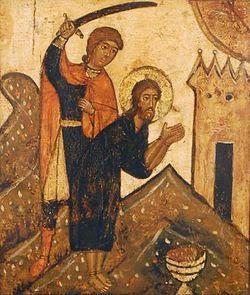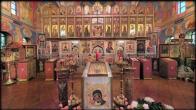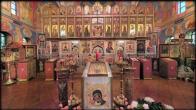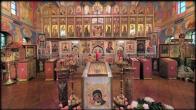You are here
NO DESTINY WAS MORE MAJESTIC OR MORE TRAGIC THAN THE BEHEADING OF ST JOHN THE BAPTIST

Metropolitan Anthony of Sourozh
We have become used to turning to God for help in every need and every circumstance in our lives. We expect that in response to every call, to every cry of anguish, suffering, fear, the Lord will stand up for us, will defend us, will comfort us. We know that He does so constantly, and that He showed us the extent of his concern for us by becoming man and dying for us and for our sake. However, it sometimes happens in the life of our world that God turns to man for help. That also happens constantly, but sometimes it is barely perceived or even passes by without notice.
God constantly turns to each of us, asking, imploring, persuading us to be in this world which He loved so much that He laid down His life for it, to be His living presence, to be His living care, to be able to see, to do good, to be attentive. He says to us that everything good that we might have done for anyone, we did for Him, and by the same token, He appeals to us here to be, as it were, in His stead. Sometimes, He calls certain people to more directly be of service for Him. In the Old Testament, we read of the prophets. The Prophet Amos says that a prophet is someone with whom God shares His thoughts. He shares not only His thoughts, but His works.
Remember the Prophet Isaiah, who had a vision of the Lord looking around and saying: Whom shall I send? And the Prophet stood up and said: Me, Lord.... But lo, among the prophets, among people who served God with all their heart, with the fullness of the great power of their souls, there is one whose memory we celebrate today, and whom God called the greatest among those born on earth.
That was St. John the Baptist.
And truly, when you consider his fate, there is no destiny more majestic or more tragic. His entire destiny rested in seeing that the One Who is the Lord grow ever larger in the sight and consciousness of the people. Remember the first thing said about him in the Gospel according to Mark: “He is a voice crying in the wilderness.” He was but a voice. Yet he became such a singular one, became so indistinguishable from his service, that he became only the voice of God, only the herald; though a person, a person of flesh and blood, a person who could pine, and suffer, and pray, and seek, and stand firm in the face of approaching death, ultimately such a person actually no longer existed.
He and his calling were one; he was the voice of the Lord, thunderously sounding in the midst of the human desert, the desert wherein souls are empty - for although there were people around John, the desert nonetheless remained unchanged. Further, the Lord Himself says of him in the Gospel that he is the friend of the Bridegroom. The friend who so powerfully, so firmly loves the bride and groom that he is able to forget himself and be a servant to their love, and to serve in such a way as to never appear superfluous, to never be there when he is not needed. He is the friend who is capable of defending the love of the bridegroom and the bride and yet remain outside, remain a keeper of the mystery of that love.
Here is another great mystery of one who is able to, as it were not become for Him something greater than He. Farther on, the Baptist himself says of his relationship to the Lord, “I must decrease, to become nothing, so that He might increase.” It is necessary that I be forgotten, so that people remember Him alone; it is necessary that my disciples turn away from me and, like Andrew and John on the shores of the Jordan , go to follow after Him alone, with hearts inseparable [from Him]. I look forward in life to no longer being! The final, awful image is of John already in the prison, with the circle of approaching death already tightening around him, already having no way out, at a point when that enormously great soul wavered. Death was approaching, his life was coming to an end, and he had nothing of his own.
Behind him lay only his podvig of self denial, and before him lay the darkness. At that moment, when his spirit wavered, he sent his disciples to ask Christ whether He was the One Whom we awaited. If He was, then the self-mortification, the living death, of his youth had been worthwhile. If He was the One, it had been worthwhile to progressively diminish over the years so that John might be forgotten and only the image of the Approaching One might grow in people’s eyes. If He was the One, it was also worthwhile to now die that final death, for everything for which John had lived had been accomplished and completed. But what if He were not the One? In that event, everything was lost: his youth, his enormous power as an adult, everything was ruined, it was all pointless, and even more terrifying, it had happened because God had apparently “fooled” him.. God, who had called John into the desert, God, who had led him away from people, God, who had inspired him to the podvig of self-mortification. Could it be that God had fooled him, that his life was over, and that there was no return? And lo, having sent his disciples to Christ to ask the question: “Are You the One Who should come?” John does not get a direct, comforting answer. Christ does not reply, “Yes, I am the One, go in peace!” He merely gives the prophet an answer spoken by another prophet: that the blind gain their sight, the lame walk, the dead are resurrected, and the poor herald the Gospel.
He gives an answer from Isaiah, and does not add His own words, except for one awesome admonition: “Blessed is he, whosoever shall not be offended in me.” “Go you way, and tell John…” That was the response that reached John while he was awaiting death: believe to the end; demand neither evidence nor proof, nor signs: Believe because you have heard the voice of the Lord within the depths of your soul, directing you to do the works of a prophet. The prophets in their sometimes extremely great spiritual struggles are somehow able to lean upon the Lord for support. God supported John only in that He directed him to be the Forerunner, and for that sake to demonstrate extremely strong faith, confidence in things unseen. That is why our spirit tugs at us when we think of him, why every time we think of a podvig without limit, we remember John. That is why he was the very greatest of all those naturally born and renowned for marvelous grace.
Today we celebrate the day of beheading…. We celebrate…. We are used to understand the [Russian] term prazdnovat’ as meaning “to celebrate,” as something joyous. However, [“prazdnovat’”] can also mean “to be left with nothing to do.” One can have nothing to do because joy so floods the soul that doing ordinary work is impossible. However, the same can be because grief or horror causes you to simply drop everything. Such is today’s celebration: what task will you take on in light of what we have heard today in the Gospel? And lo, on this day, when you give up in light of the horror and greatness and enormity of this destiny, the Church calls us to pray for those who died - also in terror, trepidation and confusion, and sometimes in despair - on the field of battle and in torture chambers, who died alone.
After venerating the Cross, pray for all those who laid down their lives on the field of battle so that others might live, who fell to earth so that others might leap up. Let us remember those who perished - not only in our own time, but throughout the millennia - through awful deaths because they knew how to love, or because others did not know how to love. Let us remember everyone, for the Lord’s love embraces all, and because great John intercedes for everyone in prayer, John who went through the full tragedy of sacrifice to the end, to his death, without hearing a single word of comfort, but only with God’s powerful command: “Believe to the end, and be faithful to the end!”
Amen.
PARISH LIFE
RECENT VIDEOS
Address of our Cathedral
Subscribe to our mailing list
While all the materials on this site are copyrighted, you may use them freely as long as you treat them
with respect and provide attribution on the Russian Orthodox Cathedral of St.John the Baptist of Washington DC.









